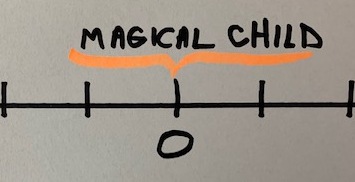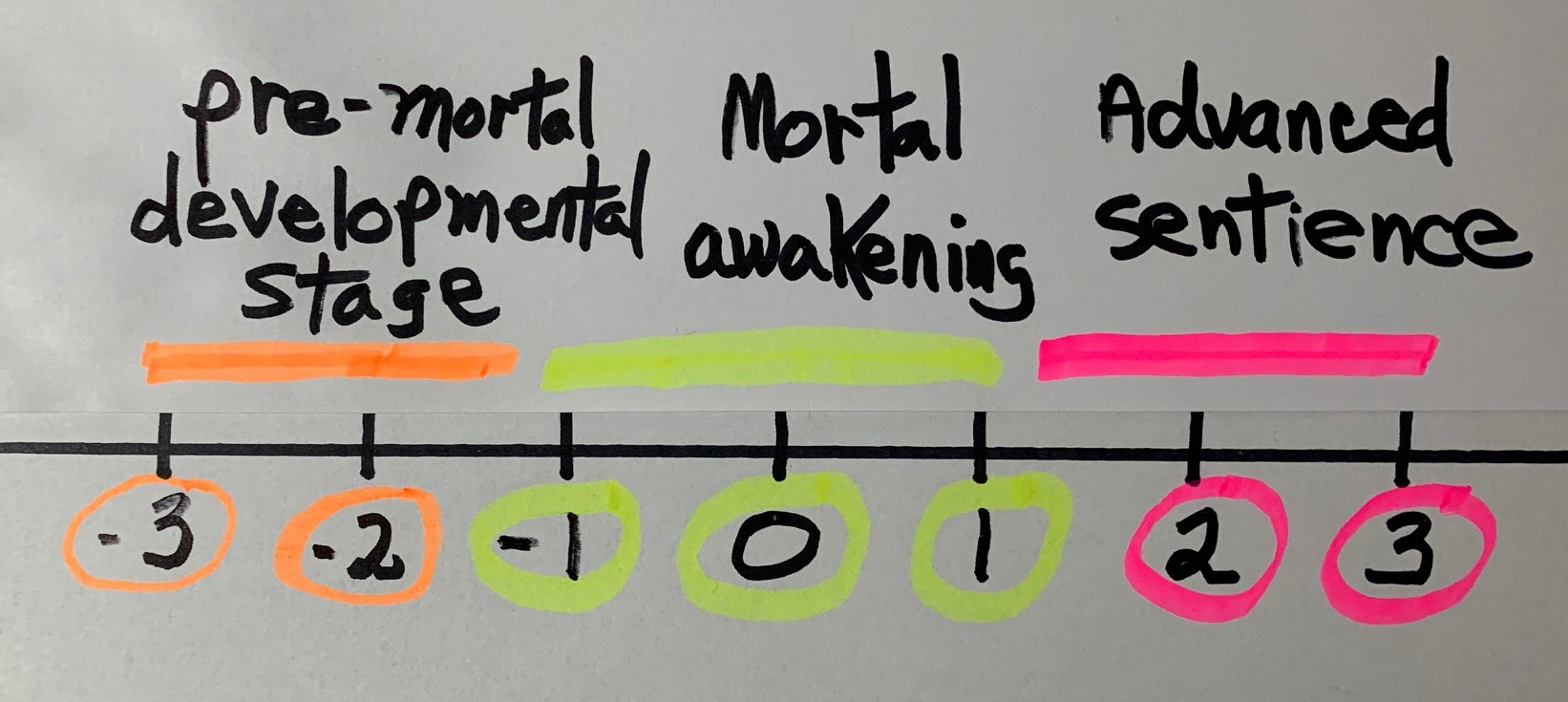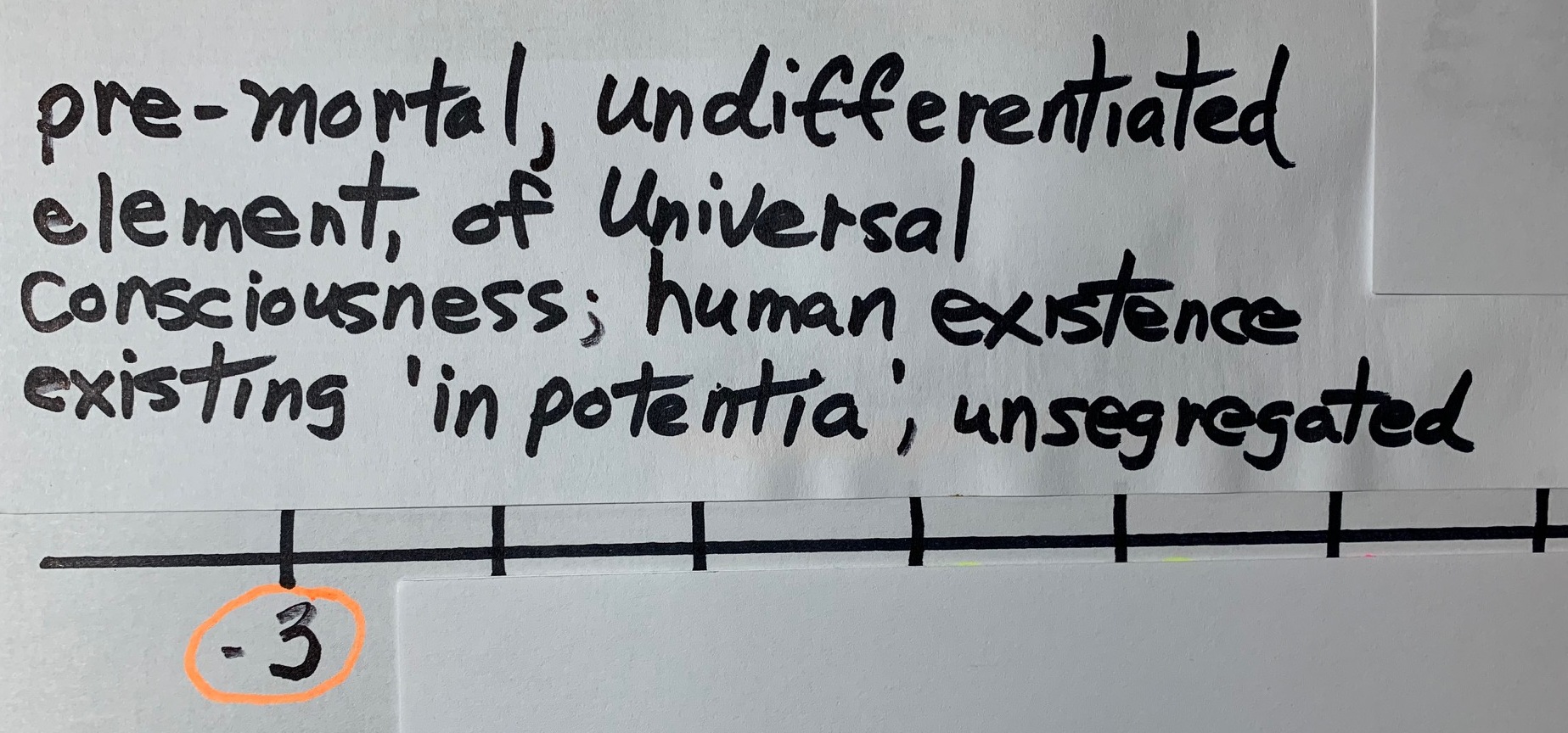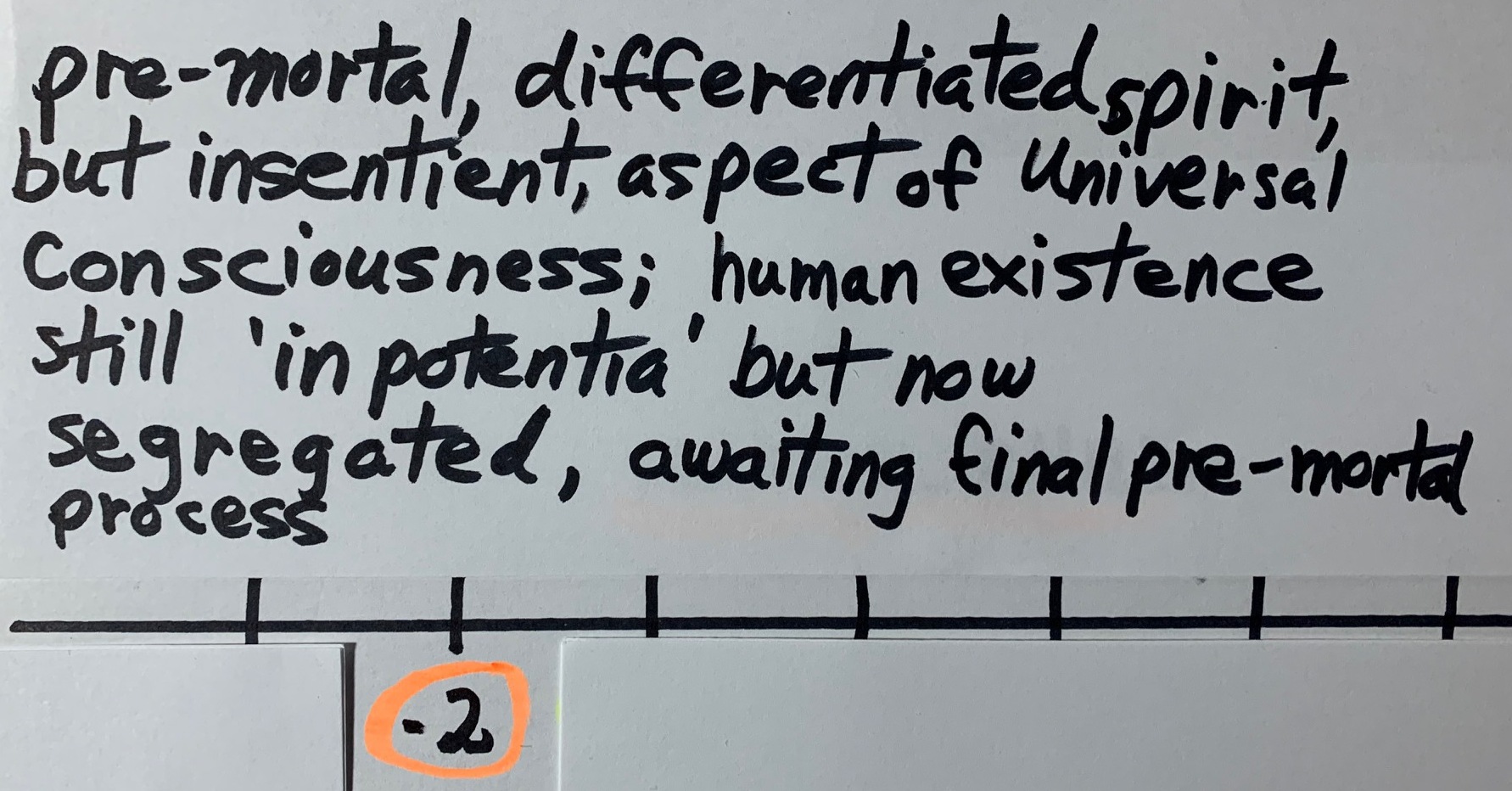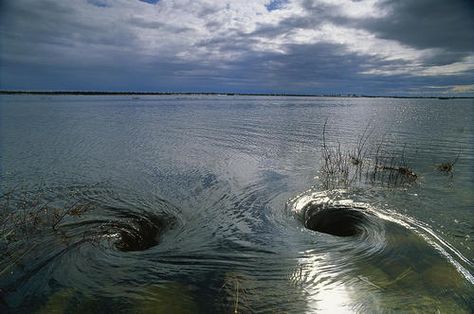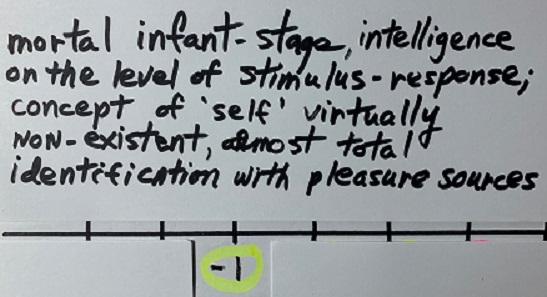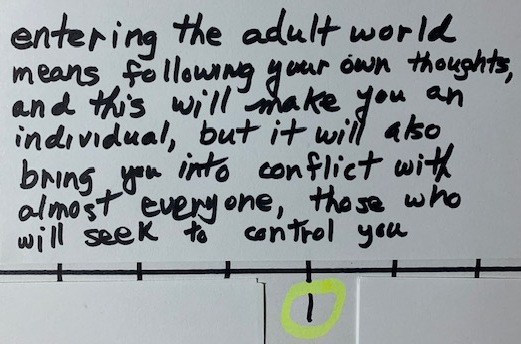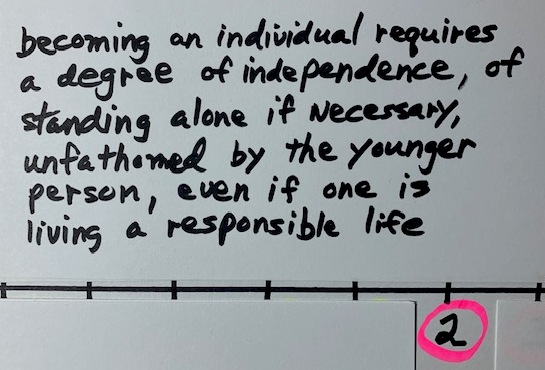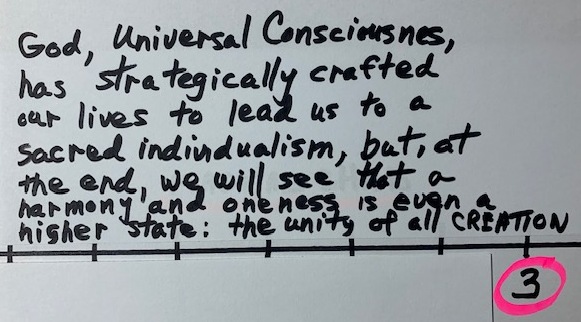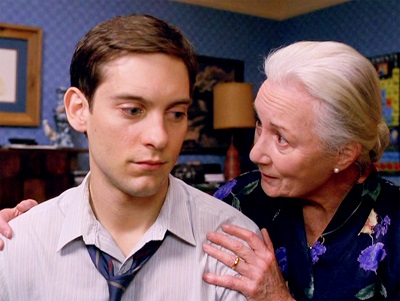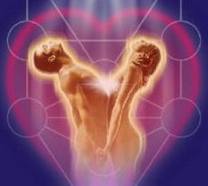|
home | what's new | other sites | contact | about |
|||||||||
|
Word Gems exploring self-realization, sacred personhood, and full humanity
Soulmate, Myself:
return to Wordsworth's 'Ode' main-page
I see the development of human sentience profitably featured by the number-line concept.
The correlation will become evident as we proceed. To my way of thinking, Wordsworth’s – what I call – “magical child”, the la-la-la high-spirited one, is right in the middle of the action.
Call it the “zero” point.
What does this mean? I think it means that the “magical child” still lives in two worlds. The remembrance of celestial spheres lingers in the spirit. Wordsworth put it this way: Not in entire forgetfulness, And not in utter nakedness, But trailing clouds of glory do we come From God, who is our home: Heaven lies about us in our infancy! The magical child – shall we say, from its perspective -- is neither yet fully individual nor fully connected to Source. It stands, precariously, upon a fulcrum of the developmental process of human sentience. We will have more to say about this magical child. However, the big picture, as it appears to me, comes in three major sections:
As we build a framework for understanding, we’ll also want to consider information from Professor Daniel Robinson of Oxford -- one of the great teachers (now passed on) – a distinction he made concerning the concepts of stimulation, perception, and cognition. The following is reprinted from an article on “beauty.” ************************************ Stimuli (Latin, “goad, prick”) are those actions, acts, or procedures that evoke a reaction from the mind. The stimuli may be visual, audio, physical, or a mix of them. It may be an object, event, or a factor capable of inciting a physiological response. Any of the five senses will respond to a particular stimulus. Sensory organs can detect external changes (such as temperature, light, sound, etc.) or internal changes (loss of energy results in hunger). The sensory system signals these changes to the brain which elicits a response. The response can be in the form of physical activity (move, run, change shape, etc.) or internal response (perspiration). A mechanism of stimulus recognition in animals involves:
do bees see the beauty of a flower Bees seem to be witnessing something attractive; the intense color of flowers seems to be a drawing element in the pollination process. Or maybe it’s the scent or something else that summons the bees. We can’t be sure. But let’s grant for the moment an ability to bees to access the “beauty” of flowers. Would this acknowledgment of beauty on the part of the bee correspond to human appreciation of Beauty?
That’s not possible. Dr. Daniel Robinson, in his Oxford lectures on the work of Immanuel Kant (see them on youtube), asks the question, does a dog see a tree? A simple question but not so easy to answer. It’s clear that the dog sees something as it's able to navigate its way for purposes of urination-marking, but “does the dog see a tree as a tree?” The dog may see a large object with rough exterior, one of general vertical placement, but “does the dog see a tree as a tree?” To see a tree as a tree represents a high level of cognition.
stimulation, perception, conception The dog undoubtedly knows that a large vertical object of rough exterior blocks its path, but to see a tree as a tree requires a certain abstract knowledge, an awareness of a general category of “trees,” as opposed to a certain individual tree. To see a particular tree as part of a larger family of "trees" is a quantum leap, far too high even for good jumpers like dogs. Dr. Robinson makes an extremely valuable comment by drawing distinction among stimulation, perception, and conception. A lower form of life might be incited to movement by a shaft of light, that is, mere stimulation as a result of photon activity. Editor’s note: I sometimes make reference to my young-teen state of mind, rather, a lack of it, by comparing a boy's lower level awareness to a worm vaguely aware of a light source. This is not advanced sentience but mere “stimulation.” And if the bees “see” the flowers, and have some minimal awareness of the “beauty” of color, I would suggest that any such appreciation of floral beauty would be on par, or lower than, that of the dog which does not see a tree as a tree. Perception, as we learn from Dr. Robinson, moves us up the line of cognitive awareness. A perception is an awareness of stimulation. I think the dog lives on this level. It is aware of stimulation, and also perceives trees, but does not mentally conceive of trees as trees. Conception takes us a step further, a gigantic one, wherein perceptions are categorized now as ideas of the world, sorted into general headings. An apprehension of Beauty would follow this order of cyber-evolvement. **************************************** Does the ‘magical child’ see a tree as a tree? This is not possible. The child will see a tree, or a flower, or a bird, but not in a conceptualized way. But let's slow down and take this a step at a time.
While the stages of human sentience could be divided variously, I see at least seven levels (-3 to +3), and I’ll begin at the beginning (or, maybe before the beginning).
“I am not an individual. I’m not yet even what the Spirit Guides call a ‘spark of God.’ Right now I’m still pure undifferentiated Universal Consciousness (UC). That’s the starting point, everything comes from UC; all the atoms and galaxies, all the planets and suns, birds and trees, flowers and stones – everything was made from UC; people too. At the moment, I might say, I have human existence but only ‘in potentia’ in that it’s the Creator’s intent to give birth to more sons and daughters. But that’s still in the future. At the right time, I will emanate from God as a ‘spark,’ a portion of UC marked for eventual segregation to become human. Some people unwisely say that each human being has an eternal history, stretching all the way back, just like God. This distorts the reality. Well, it’s true in a general sense in that I’m made of UC and that’s eternal, but I myself have no self-existence – not like the great ‘I Am That I Am’ -- and I will very much have a definite starting point as a sentient, differentiated being. But that starting point is not a specific instant but a ‘smeared’ point over a very long time, as the road to full sentience, full maturity, in God’s Family, is a most arduous and painful process.”
“I’m not an individual. I have no consciousness, no sentience. But I am now a ‘spark of God.’ This means that I’ve been ‘struck off’ from the Creator, segregated, to enter the mortal birth-process. Can I now be called a ‘differentiated’ being? – sort of, but not really. I mean, I am differentiated in terms of being set apart from the infinite mass of UC, that’s true, but ‘differentiation’, in the robust sense of somewhat emulating the Creator as a stand-alone intellectual force, is still very far away. But I don’t mind. I have my ‘ticket to ride’ now, no date has been set, but ‘I’m in the hopper,’ on my way to becoming a full-fledged, actual son or daughter of God, with awesome and potentially infinite powers. But this too is very far away.”
Editor’s note: Stage “-2” is well represented by Dr. Kastrup’s analogy of the two whirlpools. Each is a separate entity, but only apparently so as both whirlpools are part of the same underlying essence. So it is with the “sparks” of God. “I’m still not an individual. I have no concept of my own person. Hardly. As psychologists tell us, infants can’t even tell the difference between themselves and their mothers. Right now, all I know is that it feels good when I eat, and so I like the source of the food. I hear that she’s called ‘mother’ but at the moment I have no idea what this means, she just makes me feel good, and I couldn't tell you where she begins and I leave off. It feels like I'm one with her. And anyway, I can’t think much, or at all, at this stage, and it seems that I’m just a bundle of sensory receptors looking for comfort.”
“I’m four years old. Am I an individual now? I’m not sure how to answer that – depends how you define the term. I mean, I definitely know that I’m not my mother, so at least that’s settled. But, as I listen to the grown-ups, I’m sure not like them. All they do is worry about money, and politics, and jobs, and the weather, and who takes out the garbage. So since they're grown-up I guess they would be “individuals,” but I live in a totally different world. I have a carefree life. I just run and play all day long. I do not yet 'see a tree as a tree', but instead, each item of the world and nature is unique for me, never seen before, an object for which I express 'wow' and 'it's so much fun' and 'can I have it again?' Everything I see, it's like the first time! I chase butterflies, and blow soap bubbles to see the rainbows, and wish upon stars, and paint pictures of smiley-faced suns, and draw flowers with colored chalk on sidewalks, and try to snatch hopping little toads in the garden, they make me laugh so much. I see beauty everywhere, and, oh, how I wish I could catch a bird so I could pet it and hold it close. But the grown-ups never talk about important things like this. I think what’s happening is that I have “one foot in this world” but another still in the celestial realm where God is. The image of that heavenly world is starting to fade a bit, but I still feel it, it's in my dreams, and I can see it in all aspects of nature. I see light everywhere. I think it’s because, as the Gospel Of Thomas said, “light is my home, it’s where I came from.”
“I am 17, almost out of high school. Am I finally an individual yet? I suppose I am, but, even though this is what I’d wanted since I was a little ‘spark’ of God, I feel no cause for celebration. I know what happened. First, I vaguely remember my joyous ‘magical child’ years when everything was sunshine and light. How I miss those years, at least, the joy I had then; those were the happiest days of my life. But, I well recall, something started to change for me around age six or seven.
Almost overnight, I stopped drawing pictures of smiley-faced suns, and began to think about what it would be like to be a grown-up. I imagined myself becoming a doctor or a farmer or a fireman or a lawyer or a teacher, and I would pretend being these professions. It was the time when I started to "see a tree as a tree." Looking back on it now, I guess it was the end of ‘the magical child.' Well, I am my own person now, and I see how the process took me over. With each passing year, as I learned more, I began to have my own thoughts, my own opinions, and this, to my surprise, brought me into conflict with those around me. I realized that I had to stand up for myself, defending my right to think as I wanted, and, as I did this, almost as a by-product, I was forced to “become my own person.” It wasn’t really a goal, but life won’t let you live peacefully, you have to insist on yourself, almost at every turn, if you're going to be healthy psychologically. Next thing you know, you’re what they call an ‘individual.’ But the price is high, and people around you will not like you thinking for yourself, and they'll begin to distance themselves from the subservient ‘good little boy’ of the past. They'll try to say you're 'rebellious' or 'going through a phase.' But how can you grow up and make your own way in the world if you don’t respect your own mind? But nobody cares about that, they just want to shun you if you don't do what they say, if you begin to think your own thoughts.”
“I am 60 years old. Those halcyon days of picking wild flowers and chasing frogs seem almost an unbelievable memory. And yet, I do believe it. There was such a time. I can still feel it. So, am I an individual now? I know this to be profoundly true, in a manner that escaped me as a young adult. What I mean is, as that young person, and for succeeding years, it was my desire to seek for spiritual maturity. And yet, as I look back on the thoughts of that 17 year-old, well, all I can say is, there was no conception of what yet needed to be accomplished. The biggest problem, as I see it now, was that, even though I talked a lot about 'being my own person,' I was still actively involved in groups. Nothing wrong with groups, per se, but it all becomes toxic, very quickly, if there’s a Dear Leader at the helm attempting to legislate definitions of morality. This grave error caused me untold suffering for many years. I call it an error, but, in truth, it was a severe classroom in which I needed to learn about the essence of cultism. I thought I was doing well as a young adult, trying to think my own thoughts, learning a lot, doing my best to live according to my own conscience, but, in actual fact, I was not doing this. I had surrendered autonomy to some 'strong father figure' and, to my chagrin, had allowed him to do my thinking for me. I still can't believe I let that happen! Why did I put up with it? Why did I stay for so long? But my life then was led by many different fears – the fear of never finding happiness, the fear of not being noticed, of not measuring up, of being rejected; I could go on. By my own way of reckoning, I needed to reach age 60 to finally ‘grow up’ and become the “individual’ I’d always aspired to be. I had no idea as a young person just how much one eventually needs to separate oneself from the world in order to become a truly free human being.”
“I’m a few years past ago 70 now. Has my sense of individuation heightened as I near the end? I suppose it has, but I don’t think about that so much anymore. Not that it’s not important, it’s fundamentally important, but, once achieved, we find God whispering to our souls that there’s something else. All of the trouble associated with becoming 'one’s own person' was meant not so much for the individualism, of and by itself, but as a personal, inner strength to do something else. All things being equal, and in an ideal world, God did not make us to be steel-eyed isolationists, living atop a mountain as hermits in a cave with Methuselah. God is the author of family, and marriage union, and convivial community living, which, eventually, will unite the entire cosmos, all of God’s family, in one happy conclave. And so, yes, we are meant to live our eternal lives in association with others, and all of the struggle toward individualism was but prelude to sacred collectivism. In our world, though, we have to be careful. People cultishly surrender critical reasoning faculties to seek protection and favor of a group. This is poison to one’s spirit, and takes us in the wrong direction. There's a right and wrong way of allying oneself with others. As we move toward a union and harmony with all creation, we are to do so from a position of inner strength, of never compromising one’s ‘internal guidance system’ by which God personally communicates with us. And so I spoke too soon to declare that I was grown up at 60. I now think the legal age for maturity is closer to 70.” Editor’s note: One of the commentator’s on Kant – it may have been Muller from the 1800s – opined that there is a tendency not to come into one’s own sense of fuller maturity until the 60s are reached. The reason for this, the writer thought, is that until then one is often psychologically tethered to an older generation, a subtle proclivity to offer deference to ones who have gone before. In my own case, I recall, about 15 years ago, during a psychic reading I received a message from Spirit Guides advising me that it was time to stop being a good little boy, and to offer what I see, to speak plainly, and take my place among the adults (also, around this time, I received many messages, to the effect, "you need to trust yourself a whole lot more"). Einstein said that unwarranted respect for authority may be the greatest detriment to achieving new insights. When we’re younger we engage in this kind of forbearance, I think, without even realizing it. We grew up doing this. It’s like not being aware of a humming air-conditioner, until it shuts down, and then we perceive a refreshing silence.
from Genesis to Wordsworth As I constructed this cosmic-view picture of the development of human sentience, I noticed an echo from concepts discussed in “The Wedding Song” and the “made in the image” articles on the “God” page. The symmetry is somewhat astonishing. Let me offer a very brief recap of what we’ve seen so far:
Notice how we begin, in a sense, in a collective state at stage “-3” and eventually find ourselves in “+3”, another collective state. The New Testament verse comes to mind: God is all, and in all. The main difference between these two polar-opposite levels of existence centers upon human sentience and individuation. In “-3”, though existing only “in potentia”, we are one with God and each other, but not individualized and not sentient. But by the time we make it to “+3” we enjoy all of these attributes along with, once again, a unity with God and all others. During this long journey, we experience a certain poetical, even ironical, turn of events: we begin in an “all-connected” state, but then are “struck off” from God as separate individuals – and why? - for the purpose of later entering total unity once more. Is this not strange? Editor’s note: Quantum-mechanics father, Werner Heisenberg, borrowed the term “in potentia” from Aristotle to speak of objects not yet in existence but invested with such high probability of reification that he deemed them already enjoying a certain measure of reality. See more on the “quantum” page. splitting ‘the adam’
Elsewhere I’ve presented much evidence that the Bible, in the main, is a man-made work and no infallible guide. However, I’ve also stated that certain sections of the Bible, it is very clear, do represent wisdom channeled from the afterlife-worlds. There are sections of Genesis which deserve special consideration. The following summary comments represent a great deal of research, material discussed at length in the above-referenced writings. I would encourage you to review the original articles. However, it is somewhat astounding to discover that the developmental sentience-stages presented above, in broad outline, conform to the message buried in the details and original language of the Genesis account. Consider the symmetry: When the mythical Adam is originally introduced in Genesis, this entity is neither male nor female – but an androgynous being. The very word “Adam” in the original language means “the Adam,” that is, “the representative human.” Later, “the Adam” is split into male and female with the coming of Eve. The male was not first but came into being at the same moment when she arrived! This detail of the text is buried in poor translations of the Hebrew. There is much information here, and I think you’ll want to review the original writings, but let’s consider what’s happening in this ancient work. It’s a teaching device, a grand metaphor, to portray, in summary form, what we learned from the “Wordsworth developmental stages.” Adam is originally “alone,” that is, “all one,” and what happens then? – there’s a separation, an individuation, producing male and female. But notice the grand scheme of things, the overall message: Humanity begins in a state of all-connectedness, “all one,” but then is “struck apart,” becomes individuals, only to be sent on a long journey to bring themselves back into a state of oneness and harmony with all creation. The symmetry is astonishing! See the details in the original writings.
|
|||||||||
|
|


